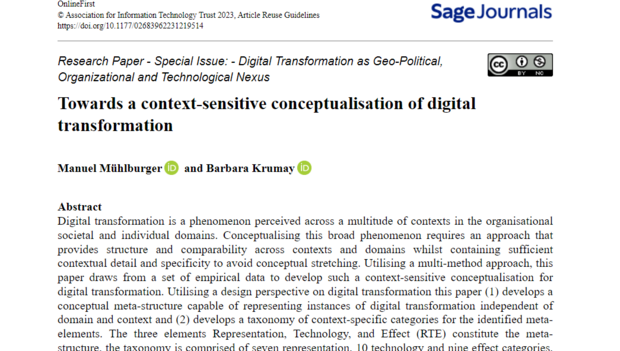
Manuel Mühlburger und Barbara Krumay (JKU Business School, Institut für Wirtschaftsinformatik - Information Engineering) haben erfolgreich ihre Publikation "Towards a context-sensitive conceptualisation of digital transformation", öffnet eine externe URL in einem neuen Fenster im Journal of Information Technology (VHB JOURQual3: A) publiziert.
Das Phänomen der digitalen Transformation beschreibt eine Vielzahl von technologiegetriebenen Veränderungsprozessen im organisationalen, individuellen und gesellschaftlichen Kontext, die bisher nur teilweise konzeptionalisiert wurden. Mittels Multi-Methoden-Ansatz basierend auf qualitativen und quantitativen Daten wurde eine kontext-sensitive Konzeptionalisierung von digitaler Transformation entworfen. Damit trägt diese Arbeit wesentlich zur Weiterentwicklung des Konzepts der digitalen Transformation bei.
Abstract
Digital transformation is a phenomenon perceived across a multitude of contexts in the organisational societal and individual domains. Conceptualising this broad phenomenon requires an approach that provides structure and comparability across contexts and domains whilst containing sufficient contextual detail and specificity to avoid conceptual stretching. Utilising a multi-method approach, this paper draws from a set of empirical data to develop such a context-sensitive conceptualisation for digital transformation. Utilising a design perspective on digital transformation this paper (1) develops a conceptual meta-structure capable of representing instances of digital transformation independent of domain and context and (2) develops a taxonomy of context-specific categories for the identified meta-elements. The three elements Representation, Technology, and Effect (RTE) constitute the meta-structure, the taxonomy is comprised of seven representation, 10 technology and nine effect categories. We evaluated our results utilising a card sorting approach in a workshop setting. The proposed conceptualisation is capable to accommodate context-specific manifestations of digital transformation in all tested environments thereby indicating its applicability as a foundation for a context-sensitive conceptualization of digital transformation. The paper contributes to the evolving body of literature on digital transformation by providing a conceptual meta-structure capable of capturing manifestations of digital transformation in a uniform and structured manner across domains and contexts.








